The execution of foreign court decisions in France and in Canada: feedback and shared views (Fr)


The regulation has just come into force in France, two years after its publication in the official European journal.
This regulation, directly applicable in the French legal order since Saturday January 10, will allow litigants from a member country of the European Union to avail themselves of a court decision in another country of the Union without having recourse to an exequatur procedure in order to carry out the enforcement of the decision in the country where the law is invoked.
The execution of court decisions within the EU allows in particular a decision in civil or commercial matters, enforceable in a member state, to automatically obtain enforceability in any other EU country.
The new rules will also allow employees working in the EU to take legal action against an employer established in a third country before the courts of the Member State in which they usually work.
In addition, legal certainty for choice of court agreements between companies will be strengthened: previously, it was possible to circumvent choice of court agreements by bringing the dispute before the courts of another Member State (instead of designated court), so as to postpone the settlement of the dispute. These new rules thus put an end to these abusive maneuvers by guaranteeing the priority of the designated court, in the event of parallel proceedings.
Some critics of the nationalist provisions of our civil law spread the rumor that the privilege of jurisdiction under articles 14 and 15 of the Civil Code has fallen into disuse and that it is no longer part of positive law.
However, it is not.
Prieur jurisprudence
However, as a precaution, the French defendant who intends to resist the execution
of a decision made against him in the USA will be well advised not to submit without
reservations to an American investigation procedure.
The French exequatur procedure differs according to whether one is in the presence of a common law exequatur, that is to say outside any international convention or a simplified exequatur on request governed by the right of the European Union.
In the ordinary law procedure, articles 14 and 15 of the Civil Code constitute an effective defense.
This defense only exists at European level in civil and commercial matters which are excluded from the scope of Regulation No. 44-2001 known as Brussels I (3).
The American procedure does not experience the same obstacle to the enforcement of foreign judgments, because there is no equivalent to articles 14 and 15 of the Civil Code in American procedural law.
However, there is a defense which can be effective depending on the circumstances, based on the lack of reciprocity in the country from which the decision originates, the enforcement of which is required in the United States.
However, the argument could succeed before the American courts, that an American judgment pronounced against a French would not be honored in France, because of the defendant's refusal to submit to American jurisdiction by the invocation of his privilege of jurisdiction .
Consequently, in the absence of reciprocity, a French judgment condemning an American may not be exequatured in the United States.
This problem merits a comparison of the evolution of the two systems.
Article 509 of the Code of Civil Procedure lays down the principle of the character
enforceable in France of foreign decisions subject to compliance with the rules
French laws.
It is a principle that the judge of the exequatur is never a judge of the merits, he therefore
not intended to retry the facts which gave rise to the judgment.
Since the Cornelissen case law (4), which restricts the conditions laid down by the previous case law (5), he must only ensure that:
The exequatur judge may make a partial or total exequatur of the judgment submitted to him.
A party may also request the French judge to find the impossibility of the possible enforcement of a foreign judgment in France for the breach of one of these criteria.
The interest consists in retaining the competence of the French judge, by avoiding the obstacles of the lis pendens and the authority of the thing judged by a foreign court.
Furthermore, the French defendant can rely on Articles 14 and 15 of the Civil Code, to oppose the enforcement of the foreign judgment, provided that he has not given up raising this plea, by appearing voluntarily in the foreign proceedings.
In the presence of a request for the enforcement of a judgment emanating from a court of a Member State of the European Union, it is the Brussels I Regulation, replacing the Brussels and Lugano Conventions, which applies for civil and commercial matters.
Article 3 rules out the application of articles 14 and 15 of the Civil Code (for France or equivalent abroad) between nationals of the signatory states.
Nevertheless, the privilege of jurisdiction is still relevant in its matters not covered by the Regulation (fiscal, customs and administrative matters) and those excluded from its scope, namely:
For these matters applies the common law of exequatur, with the exception of
arbitral awards that follow a specific procedure.
So that the exequatur procedure is successful and therefore that the judgment for which the exequatur is requested can be executed in the desired country, it is necessary to ensure that the following conditions are met upon the introduction of the main procedure leading to upon obtaining judgment:
Once verified that these conditions are met, it is necessary to follow the simplified procedure of articles 38 and following of the Brussels I Regulation:
There is no convention on the enforcement of judgments between France and the United States.
However, the American jurisdictions easily grant exequatur to French judgments especially when it is a judgment bearing condemnation on sums of money.
Indeed, the Uniform Foreign Money Judgments Recognition Act (6) was adopted in many American states, and even in those which did not adopt it, the courts generally apply this procedure. simplified exequatur similar to that of the Brussels I Regulation.
The simplified exequatur (domestication of foreign judgment) procedure consists of registering the foreign judgment with the registry of the competent court and the notice of registration is served on the debtor, who then has a relatively short time limit for filing an opposition. In this case, a contradictory procedure opens where the judge verifies the following regularity conditions:
In practice, it will be necessary to produce in support of the factum in demand.
of exequatur, a customary certificate (affidavit) issued by a lawyer for the
jurisdiction of the country which rendered the decision to be enforced, being able to attest that the said
validity conditions are met.
This last point of reciprocity was put down by the United States Supreme Court as one of the principles of "Comity" (8).
This is no longer required in most states, so it is often easier for a successful litigant to have a judgment obtained in his country recognized in the United States, than on the contrary for a party. winner of having a judgment obtained in the United States enforced abroad.
However, there remains the problem mentioned above of non-reciprocity with regard to articles 14 and 15 of the French Civil Code.
It should be noted that French correctional judgments containing civil convictions against French citizens who have left to settle in the United States are regularly enforced in several American states. (9)
***
Exequatur Subway 2009: A judgment confirming well-established case law recognizing exequatur to an American arbitral award rendered by application of an arbitration agreement accepted by the parties.
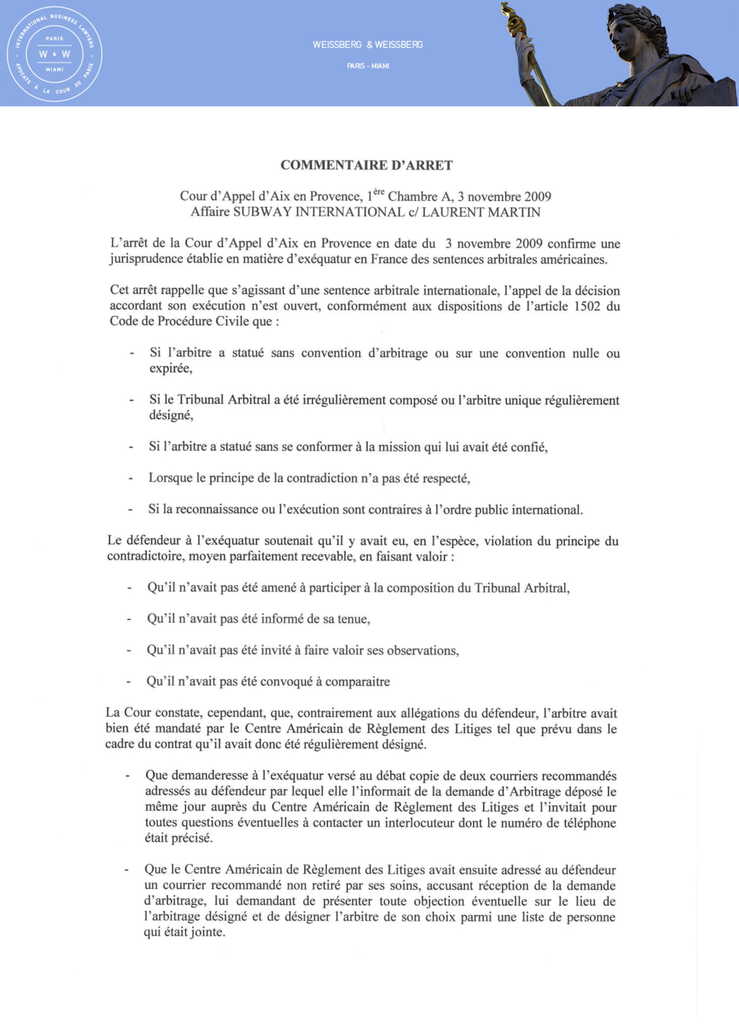
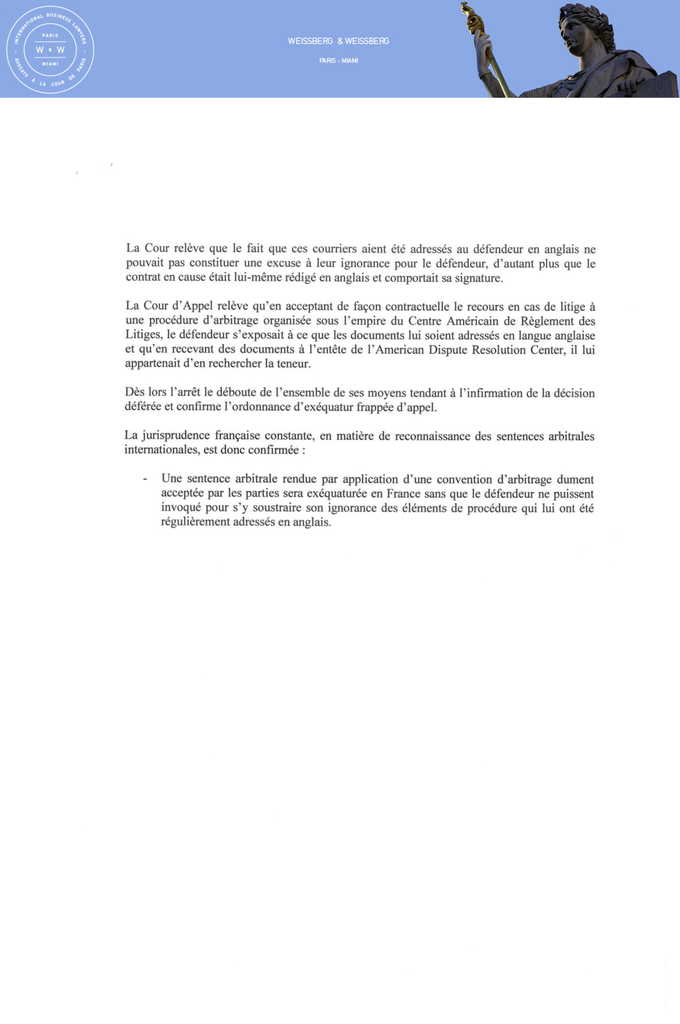
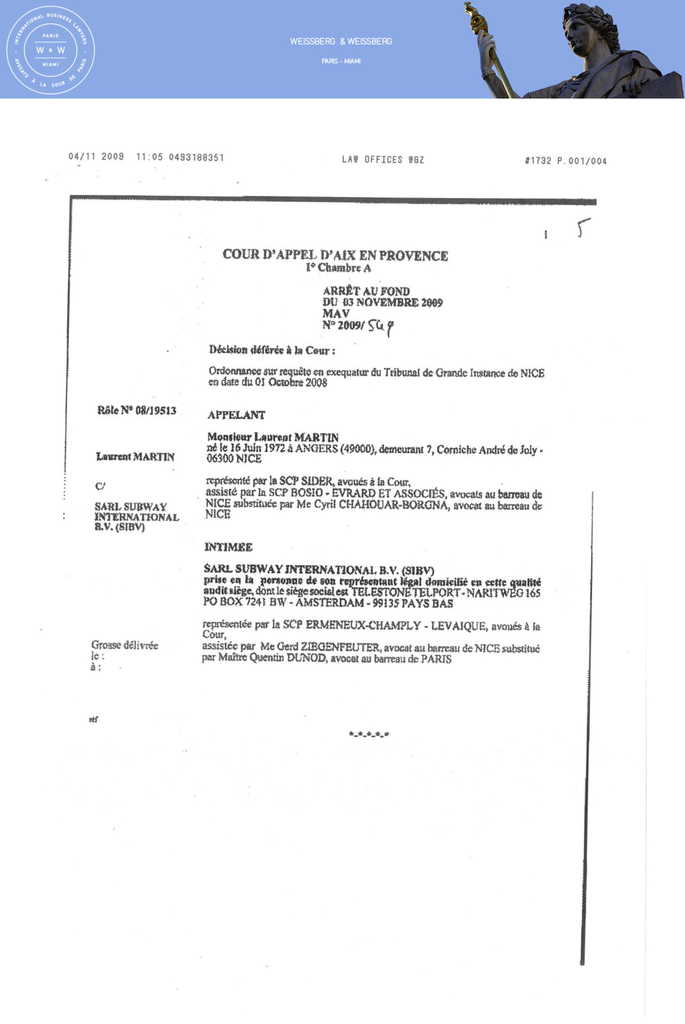
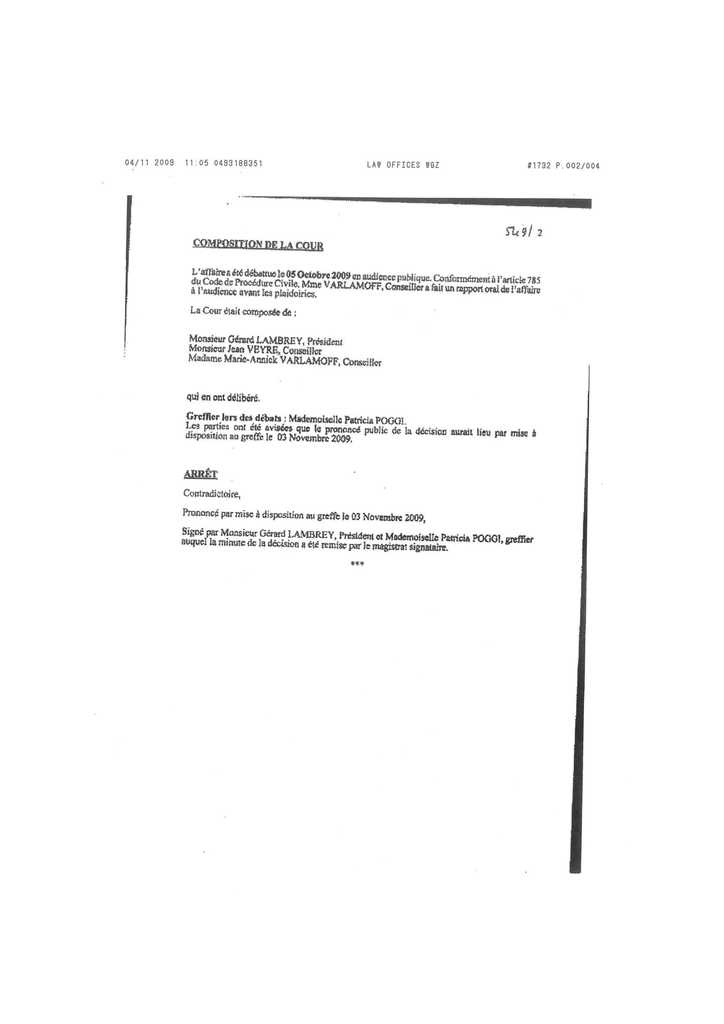
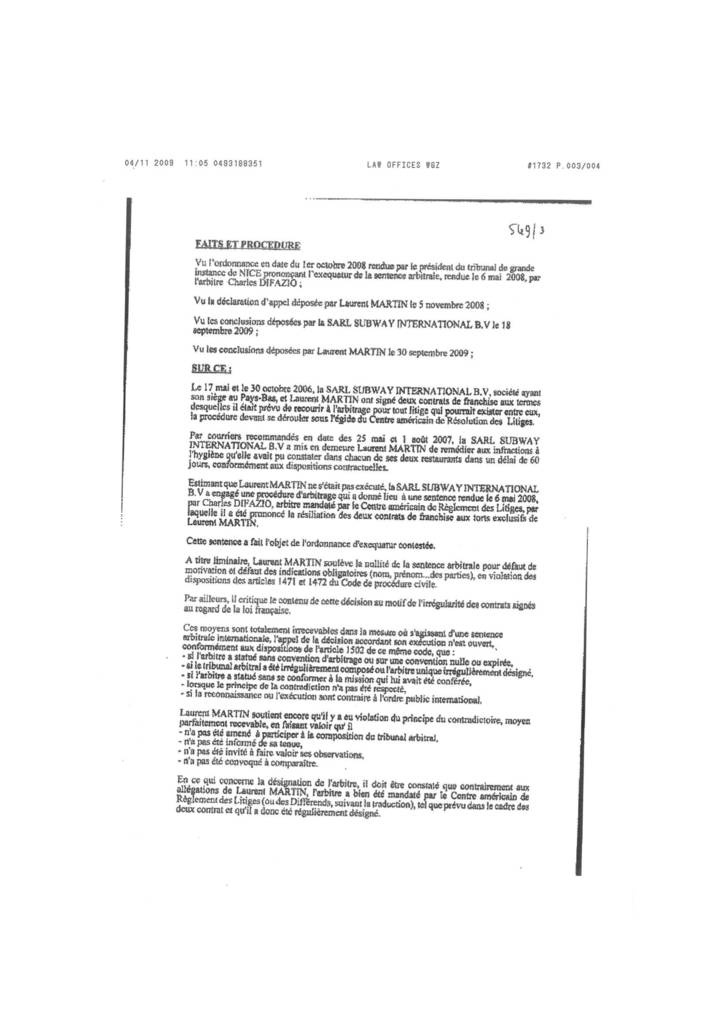
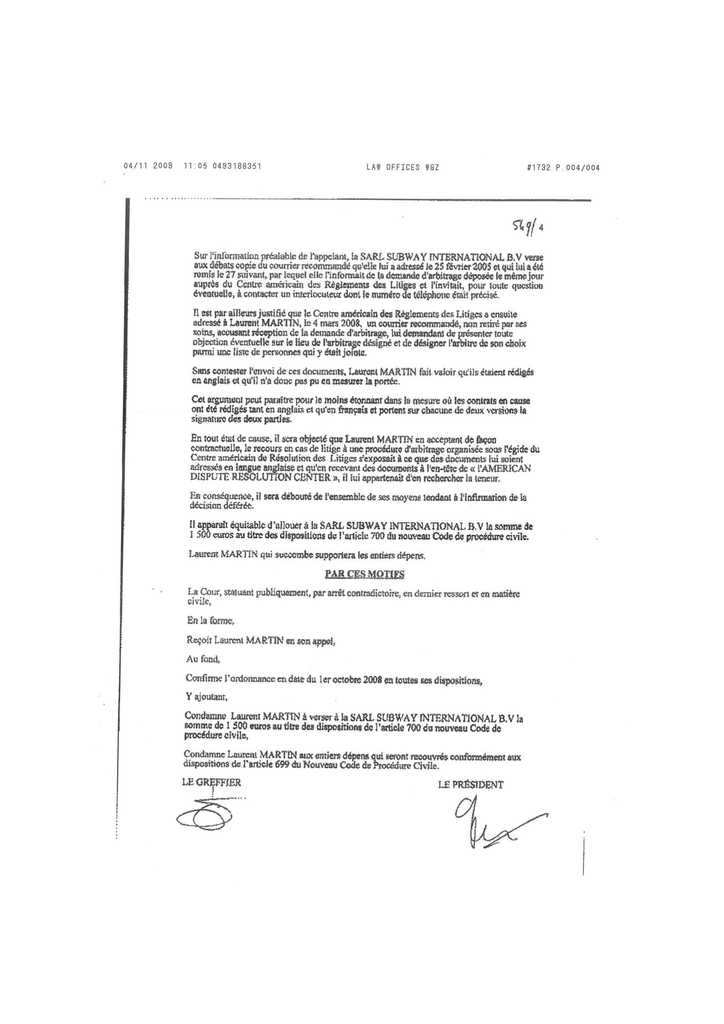
Are we really witnessing, as the subject of our study suggests, a
predominance of Anglo-Saxon law over Romano Germanic civil law in the world
contemporary economic?
The answer is uncertain because, as the study by the Council of State of June 2001 notes,
bearing on the international influence of French law, this is undeniable in many
international legal fields, particularly in that of the treaties which constitute the
supreme international legal norm and in that of community law, since within
of Europe we observe a fusion of the legal rules specific to the two systems
competitors of common law and codified civil law.
To tell the truth, we think that, in general, the same economic constraints
result in the application of fairly similar rules in the United States and in Europe. Membership
general to the sacrosanct principle of the contractual will limited only by the requirements of
international public order, makes artificial the idea of any predominance of the rule
of law from one market economy country to another.
However, the fairly trivial observation that the practitioner of international law can make
daily and which justifies a long-term strategy of legal influence,
calling for some adaptations of our legislation and practices to maintain the
the influence of our law is threefold:
English is the commercial language commonly used today by most industrial companies, which means that international contracts are most often written in English.
It is extremely common for a contract between a French company and a company
German or Asian is written and signed in its final version, in English.
Likewise, will it be observed that many large French and German companies have
the choice to adopt English as the language of internal communication systematically
employed within their group and that the European Commission which currently plans
the establishment of an Intranet for the communication of network-related information between
authorities and national courts of the 15 Member States and the Commission plans to
to use for this purpose 'a commonly understood language', in other words English.
This predominance of the English language obviously favors the United States, a nation which has the
largest internal market and a common law legal system attaching great
importance to case law, that is to say the normative nature of precedents.
It obviously favors England as well, which is an almost obligatory passage from
America to Europe, with its own high-tech sectors such as
financial and insurance law. England being part of the European Union,
it permeates European Community law which in turn influences the
European civil law countries.
The consequence of this primacy of the English language is that the documentation fund
used by jurists around the world is very largely in English which brings them
to choose the facility consisting in adopting preexisting formulas presumed to offer the
solutions to their specific needs.
The French legislator sought to limit the perverse effects of this systematic recourse to
models drawn from a foreign law by imposing the use of the French language for the
conclusion of public contracts in France. Article 5 of the law of August 4, 1994, called Law
Toubon, has: Whatever the object and the forms, the contracts to which a person
public law body or a private person performing a public service mission are
parts are written in French.
These provisions do not apply to contracts concluded by a legal person of
public law managing industrial and commercial activities and to be executed
entirely outside the national territory.
The contracts referred to in this article concluded with one or more foreign contracting parties
may include, in addition to writing in French, one or more language versions
foreign can also be authentic.
A party to a contract concluded in violation of the first paragraph may not rely on a
provision in a foreign language which would prejudice the party to which it is opposed.
This law which aims at the defense of the French language protects at the same time the
French law with modesty dictated by economic expediency.
Thus by application of this law, the sale of Canadian aircraft to French Civil Security is
materialized by the conclusion of contracts in French subject to the public procurement code
French and French jurisdictions, while the sale of European aircraft worldwide
realized by the conclusion of a contract in English ultimately subject most often to the law
the forum chosen by the parties to resolve the disputes.
In our opinion, the provisions of the Toubon law should be extended to all contracts
likely to be executed in France, whether concluded between legal persons of
public or private law.
Such a provision, incorporated into the civil code, would complete the privilege of articles 14 and 15
of the Civil Code, which, by providing that the French courts are always competent to
hear disputes in which one of the parties is French, have secured a place
predominant in French law for two centuries.
It should be noted in this regard that the application of Articles 14 and 15 is excluded between the signatories of
the Brussels Convention, but still applies to the United States.
The common law system is adversarial and favors greater ease for parties to
hear the trial and establish proof of their grievances. The discovery procedure (discovery
of evidence), is infinitely more effective than that of pre-constituted evidence, which prevails
with us.
While in the French procedure the testimonies must be produced in writing and are
as difficult to verify as to combat, in the American procedure witnesses are
heard jointly by the parties' lawyers, prior to the trial and their
depositions are recorded in shorthand, in order to be able to later establish the
sincerity and contradictions through the process of cross-examination.
As a result, Anglo-Saxon commercial procedures are never criminal, as there is no
no need to resort to judicial information, led by an investigating judge
repressive to obtain the evidence necessary for the success of his case.
This efficiency of the law of evidence translates into a greater confidence in justice
American than in French justice, in particular delivered to the avatars of 'stays of judgment'
that article 4 of the Code of Criminal Procedure imposes on commercial courts when a
criminal complaint comes, very often delaying, to stop the course of the lawsuit. 80% of
lawsuits in the United States never reach the end of judgment and find their solution
by the transactional route because, in the American procedure, the readiness succeeds the most
often to enlighten the parties on their respective chances of success before it gets too
late and a judgment with heavy financial consequences is not intervened. The American judge
is more of an arbiter of judicial combat than a sage who is asked to say in
who is right and who is right.
In France the trial is too often "a good deal" because, relatively inexpensive (it
is common that a trial costs 10 times more expensive in the USA or England than in France), it
most often results in financially advantageous convictions for the party
failing. The principle of strict concordance of the economic damage suffered and the
allocated allocation, with a statutory interest rate significantly lower than that of the
financial market makes it wise to make a bad trial last as long as possible.
Anglo-Saxon justice, more expensive, since it is up to the lawyers to conduct the trial
at the cost of long depositions generally billed by the hour, does not have the same
reluctance that civil justice to impose substantial compensation and
truly restorative to the unsuccessful party.
This is not lost on international contractors who are still seeking to seize the
most inclined to satisfy their economic objectives.
It would therefore be appropriate to enhance the attractiveness of French courts to modify our law
of evidence to include elements of 'discovery' like 'interrogation
"adopted by the Quebec Code of Civil Procedure and concomitantly with
legally restrict the use of criminal procedure in cases
by removing the stay of proceedings rule and encouraging justice to
dismiss criminal complaints with a glaring commercial basis. It should be
also to modify article 700 of the NCPC in order to impose the reimbursement of costs
actual procedural costs and attorneys' fees to the unsuccessful party.
The magistrates and lawyers are in osmosis more in the Anglo-Saxon system than in the
civil system. American judges facilitate the work of the lawyers they support
in their actions, while French judges are wary and perceive them most often
as obstructing the course of justice which they consider to be their responsibility.
As a result, American courts have more favor among lawyers than
French courts suspected of being inclined to administer expeditious justice in which
equity (and sometimes chauvinism) are often disguised under legal reasoning
opportunity.
It would therefore certainly be advisable to review the fundamentals of teaching the profession of
magistrate in France as well as the principles governing the relationships between judges and lawyers.
For example, the duty of sincerity of litigants and their counsel with regard to the
court sanctioned in US law by the rules of "contempt of court": a
party who does not refer to a court order to disclose documents, or who
conceals evidence is subject to heavy penalties including criminal. There is no
nothing similar in French law where the lie is not sanctioned as such.
This is why arbitration is more conducive to the conduct of a quality trial because it allows
parties to agree in the "arbitration agreement" on the procedure they hear
adopt and appoint arbitrators specialized in the matter which concerns them.
French law offers a broad reception to the arbitration procedure, but it still remains
insufficiently used.
With regard to contractual law, the Anglo-Saxon model also has its limits:
considerable length of contracts, due to the fact that their drafters seek to cover
all possible hypotheses, having been the subject of particular case law, is both
indigestible to the uninitiated who are businessmen and civil lawyers accustomed to
general references to the law and to more concise contracts on which only the
points that the law abandons to contractual freedom.
Because contracts of hundreds of pages become the almost exclusive affair of lawyers
experienced in scholarly reading, they tend to inconvenience businessmen
concerned with clarity and not to hinder their negotiations, and that is why we are witnessing
today looking for simplicity for contracts that everyone can read and
understand, and which refer to a law that we know is fair and effective.
However, civil law has the merit of conciseness and Cartesian logic, which deserves to be
known.
The influence of French civil law in the world necessarily requires the effectiveness of its
dissemination and the recommendations of the Council should be implemented in this regard
State, appearing at the conclusion of the aforementioned report.
1) Maintain knowledge of our law by translating the main texts and the main decisions of French law.
We will add to this the recommendation that all law schools and libraries
foreign courts and tribunals applying or providing education in civil law
in French and in particular in emerging countries receive free of charge at
the French state. As are the main French legal reference works, that
are the Jurisclasseur, the Dalloz encyclopedia, as well as the fundamental journals in French:
quarterly legal reviews, Bulletins of the Court of Cassation, Clunet, etc.
2) Modify the content and methods of teaching law in France, which must be internationalized and professionalized, which implies giving the legal professions, in particular lawyers, the means to be more powerful and better armed in the face of international competition.
This effort is incumbent both on the public authorities and on the bars of France.